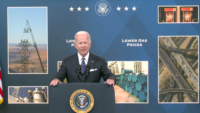After being shaken by the Republican-led House Appropriations Committee’s proposed fiscal year 2024 spending cuts–some of them deep–for the U.S. Dept. of Transportation, construction and transportation officials were relieved to see that the Senate Appropriations Committee, led by Democrats, propose funding numbers for DOT infrastructure programs that generally were up slightly or flat with 2023 levels.
Overall, the House panel measure, approved on a 34-27, generally party-line vote on July 18, would slice DOT budget resources by $5.4 billion, to $100.9 billion.
The Senate committee's version, approved unanimously on a bipartisan 29-0 vote on July 20, calls for a relatively modest $1.5-billion increase for DOT over 2023 enacted levels, to $107.8 billion. Both bills also provide funding for the U.S. Dept. of Housing and Urban Development.
Susan Howard, American Association of State Highway and Transportation Officials director of policy and government relations, said of the House and Senate DOT measures, “These are two wildly different approaches."
House committee Chairwoman Kay Granger (R-Texas) in a statement said of her panel's bill, “Instead of giving the administration more grant funding to spend, this bill gets us back to funding core missions.”
Senate Appropriations Chair Patty Murray (D-Wash.) said that the transportation measure and two others it was voting on at the July 20 session were "serious bills that can actually be signed into law."
House Committee Targets: RAISE and Transit Grants, Amtrak
Among the House committee's targets was DOT's popular RAISE infrastructure grants, which the committee proposed zeroing out. RAISE is funded at $800 million in 2023.
The panel also proposed chopping the Federal Transit Administration's Capital Investment Grants by 82%, to $392 million. The program funds new transit starts.
Industry groups warned that the House committee's recommendations would hurt transportation programs.
The American Public Transportation Association said in a statement that transit systems around the country are seeking more than $49 billion to finance construction of 69 new projects. APTA added that the House committee's recommendations "could slow or stop those projects in their tracks."
Amtrak Chief Executive Officer Stephen Gardner said in a statement that the House committee recommendations would force the railroad to put off many of its major planned modernization projects funded by the Infrastructure Investment and Jobs Act.
The Senate appropriators' proposal calls for $800 million for RAISE, equal to the 2023 level, and recommends boosting transit capital grants by 11%, to $2.45 billion.
By comparison, Gardner said the Senate appropriators' bill, which calls for a small increase over 2023 levels, is a "prudent investment in passenger rail, particularly in this challenging fiscal environment." He said it would allow Amtrak to make "important investments in Northeast Corridor assets."
Formula Highway, Transit Funds Track with IIJA
The House and Senate committees' measures do agree on increases for two important DOT line items.
Dean Franks, American Road & Transportation Builders Association senior vice president of congressional relations, underscored that the House and Senate committee bills both adhere to the 2024 funding levels set by the Infrastructure Investment and Jobs Act for the core federal-aid highway and transit formula funding programs.
In both bills, he formula highway total is $60.1 billion. up by $1.3 billion, or 2%, from 2023; the transit formula level is $13.4 billion, a 3% increase over this year's number.
AASHTO's Howard said in an interview that as the 2024 appropriations process continues, "There'll have to be some horse trading in terms of what's really important to each side, because not everybody's going to get what they want."
Anti-Stopgap Provision
Lawmakers would like to have the DOT bill and the other 11 annual appropriations measures approved by Oct. 1, when fiscal 2024 begins. But legislative disagreements have snarled spending bills, making Oct. 1 an elusive goal.
When Congress returns after Labor Day from its August recess, lawmakers will be hard-pressed to finish all of the appropriations bills by the end of September, making a short stopgap funding measure–or continuing resolution (CR) a strong possibility.
But ARTBA's Franks says, "Both bodies are further along than they usually are at this point." He adds, "The fact that they all will have passed every [appropriations] bill out of committee by August is a welcome sign."
This year, there will more pressure to avoid CRs. Under the Fiscal Responsibility Act, if Congress fails to pass full appropriations bills by the end of the year, it would trigger nearly across-the-board spending cuts, initially of 1%.
Franks says, "There's plenty of folks on both sides that don't want to see that happen." He notes that Republicans particularly want to avoid automatic cuts in defense programs and Democrats want to protect non-defense programs from reductions.
Howard and Franks point out that highway and transit formula grants, which draw from the Highway Trust Fund, would be exempt from those broad reductions. But DOT discretionary programs would be subject to the budget knife.
Story updated on 7/24 with comments from American Road & Transportation Builders Association.





Post a comment to this article
Report Abusive Comment